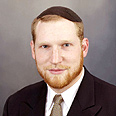

Since its inception in 2002, Nefesh B'Nefesh has been working to enable thousands of families to move to Israel and help ensure their successful absorption in the country.
Prior to creating the organization, Fass was associate rabbi of Boca Raton Synagogue, in Boca Raton, Florida.
Fass now lives in Ramat Bet Shemesh with his wife and children, including two new native-born Israelis.
Ynetnews talked with Rabbi Fass about the future of American aliyah to Israel.
What is the reason for the apparent increase in olim from North America in the last few years? Is it increased anti-Semitism in the U.S., decreasing economic opportunities there or increased prospects for peace here?
I think that more and more people are actualizing their dreams of aliyah as a direct result of the removal of the practical obstacles often associated with it. Nefesh B’Nefesh, in particular, has identified the need to minimize the financial, professional, logistical and social obstacles of aliyah - a formula that is helping to ensure the successful absorption of their olim. Whereas in the past, 50 percent of North American olim returned to the U.S., today through proper guidance services and full comprehensive support, olim arrive in Israel with a complete support system in place, whether in employment, social welfare, housing and education opportunities for their children. They are educated, informed and ready to run in a realistic manner
Of course today’s telecommunications market has shortened the distance between the Diaspora and Israel. Low-priced phone calls, email, and video conferencing have all substantially narrowed the gap. The whole world has truly become “smaller.”
As for anti-Semitism - that really has nothing to do with it. Nefesh B’Nefesh represents “aliyah of choice” and realizing one’s dreams and ideals, not fleeing from oppression or other external threats.
What kind of people are coming from North America through your programs? I hear they are mostly modern Orthodox young couples who want to settle in Anglo enclaves like Beit Shemesh and southern Jerusalem - or is the NBN "community" a diverse mix of religious practice, age and income levels?
NBN olim represent the entire spectrum of the Jewish community: Orthodox, Conservative, Reform and unaffiliated. NBN is working closely with the leaders of each of these Jewish denominations in order to maximize cooperation and appeal to each of their members to make and promote aliyah.
In the most recent group flight, in December 2004, some 70 percent of all olim were non-Orthodox.
We have young families, singles and retirees. While it is true that many NBN olim prefer the high comfort level of making their first home in Israel alongside other English-speakers, they have settled across the length and breadth of the country, in large cities, small towns, kibbutzim and moshavim.
What is the biggest surprise (good or bad) your olim are finding once they are settled in Israel?
I think that many olim are surprised at how their biggest foreseen hurdles are actually easier to overcome than they had predicted: finding a job, employment, housing, education, new settings. On the other hand, the smaller unforeseen everyday occurrences turn into the larger obstacles, being the communication barrier, new shopping (etiquette), etc..., which were less obvious to cause a ripple in their lives.
An additional interesting observation is that olim are often shocked (in a positive way) that despite the salary differences between the Diaspora and Israel they can manage on much less in Israel. And as they go about their regular, everyday lives, they occasionally have to pinch themselves to realize that they are living in Israel and fulfilling dreams they have clung to since childhood in many cases.
Prime Minister Ariel Sharon talks of bringing 1 million Jews to Israel in coming years. With few other places really having many Jews left, are most of those going to come from the U.S.? How many people have you brought so far, and is anywhere near Sharon's number going to come?
So far, we have seen exponential growth. We began in 2002 with 500 olim. The next year we doubled that number. Last year we reached 2,000 and this year we hope to bring as many olim as all previous years combined. While these numbers remain small in absolute terms, I clearly envisage a day of mass aliyah from North America. Our recent seminars for prospective olim in North America attracted over 6,500 interested people. We have 7,000 individuals at one stage or another in our processing system. I think that more and more are coming to realize that aliyah is for regular, everyday people.
What does the government here need to do to really encourage aliyah?
Clearly one of the most important things that the government can do would be to provide increased funding to all aspects of aliyah - from financing flights, to job searches and absorption allowances. Beyond this, in a general sense, a less bureaucratic, more streamlined government infrastructure would remove many of the obstacles that new olim face. NBN’s success has stemmed precisely from these virtues: we knock down bureaucratic stumbling blocks and make it EASY to come on aliyah.
What are the best (or worst) forms of preparation for aliyah? Is it best to come right after (or before) university? Or is it better to have solid professional credentials before trying to make it economically here?
This is a personal question that can vary from oleh to oleh. It is always sound and responsible to make aliyah from a position of strength. This varies from strong careers, education and financial stability. However, invariably individuals who remain in the U.S. in order to achieve these factors usually find themselves in a perpetual state of “preparation." Or equally frustrating can be their arriving at a comfortable stage and feeling secure with their capabilities and resources, but then their children are at an age that makes the move more difficult and they need to take many more factors into consideration.
The ultimate way to make aliyah is for a person to plan: to choose an appropriate career for Israel, prepare his family with frequent trips to Israel and master (even basically) the Hebrew language in order to start off right.
Nefesh B’Nefesh’s aliyah professionals are specifically trained to consult and guide each person in their quest to realize their dream of moving to Israel.
I have heard that as many as one-half of all American olim go back to the "Old Country." Do you have data on past practices? What is your "retention rate" so far?
In the past, when “making it” in Israel was much more difficult than it is today, there was a significant percentage of olim who returned to the U.S. We believe that our organization’s assistance and guidance helps assure not only larger numbers of olim, but also a more durable, successful aliyah. Although we are still in our early days, 99 percent of our olim remain in Israel today, and that is nothing less than incredible.
Each of the ethnic groups that make up Israel today has made its own unique contribution to the country. What are the special provinces of the "Anglos"?
It is hard to distinguish the general trend of the “Americanization” of Israel from the influence of North American olim. Having said that, we do know that many of our olim perform vital services, as native English speakers, in a wide array of positions for the hundreds of Israeli companies that deal with the global economy. This is particularly the case in the technology and financial sectors. I also feel that many positive American influences are starting to seep into Israeli culture, from the demand for high quality service to movements dedicated to the environment, health and consumer rights.
Do you find it funny that American Jews, who may be plagued, as it were, by "WASP's" in America, are called Anglo-Saxons when they come here?
There is irony in that, but it is not unique. In Russia, the term “Russians” referred to the ethnic majority, and was never applied to the country’s Jews. Today, we refer to the “Russians” here and they see that as rather ironic. What I find really strange is that growing up in the U.S., people of my generation laughed at our “fresh off the boat” parents and grandparents with their funny accents. Today, my own kids view me in much the same way!















